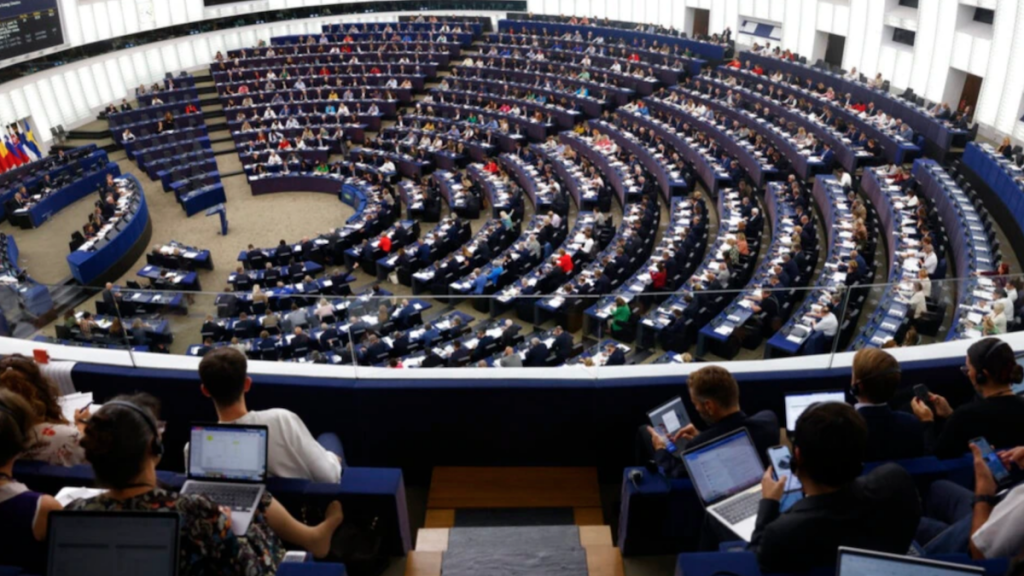"Sanctions on Ivanishvili": The European Parliament adopts resolution on Georgia
European Parliament adopts resolution on Georgia
The European Parliament voted on the annual resolution regarding the Association Agreement between Georgia and the European Union. Before adopting its final version, the European Parliament also voted for separate amendments, most of which were supported by deputies. The resolution also includes a compromise document adopted in November which recommends curbing Bidzina Ivanishvili’s excessive influence on the country.
According to one of the new amendments, MEPs urge “appropriate measures, including the imposition of personal sanctions on Ivanishvili and all those who are to blame for the deterioration of the democratic regime in Georgia.”
430 out of 608 MEPs supported the resolution, based on the report of MEP Sven Mixer, a member of the Progressive Alliance of Socialists and Democrats group; 52 MEPs voted against, 126 abstained.
The European Parliament once again calls on the Georgian authorities to release ex-president Mikheil Saakashvili and give him the opportunity to receive medical treatment abroad on humanitarian grounds in order to reduce the polarization of Georgian society.
In addition, by a resolution of December 14, the European Parliament calls on the authorities to stop politically motivated criminal cases against representatives and owners of media criticizing the government, and their families. The document, in particular, mentions the case of Nika Gvaramia, the founder of the opposition TV channel Mtavari Arkhi:
“The resolution draws attention to the affairs of the director of Mtavari Arkhi Nika Gvaramia, as well as the leaders and founders of other media (such as Formula, TV Pirveli). The European Parliament expresses its deep concern that on November 2, 2022, the Tbilisi Court of Appeal upheld the conviction of Nika Gvaramia on dubious charges.”
- MEPs: “The cause of the decline of democracy in Georgia is Ivanishvili”
- “These are words from the FSB” – reaction to the the Prime Minister of Georgia’s statement
The amendment by MEPs Miriam Laxmann of the European People’s Party (EPP) (Christian Democrats) and Anna Fotyga (a group of conservatives and reformers) expressed concern over “reports that Russian individuals and organizations are allegedly using Georgia” to circumvent Western sanctions.
The amendment calls on EU institutions to further investigate these allegations, including reports by Ukraine’s National Corruption Prevention Agency about Bidzina Ivanishvili’s ties to Russia. “If these allegations are confirmed, [the European Parliament] will demand the imposition of personal sanctions against him and his inner circle.”
Like other MEPs, Lexmann and Fotyga also expressed their serious concern about the toxicological examination report made by the American professor David Smith, “according to which many of the symptoms found in Mikheil Saakashvili are the result of heavy metal poisoning, which contributes to the rapid deterioration of his health.”
According to Lexmann, “the government of Georgia bears full responsibility for the health and well-being of the former president.”

According to a compromise document passed by the European Parliament on November 8, billionaire Bidzina Ivanishvili, whom opponents of the Georgian government consider a shadow ruler, is no longer referred to as an oligarch. However, the name of the businessman is still used in the context of “deoligarchization”, and a demand is made to curtail his influence.
The document also refers to the persecution of opposition media in the country, political persecution, the procedure for electing a public defender, and that the European Parliament calls on the Georgian government to send former president Saakashvili for treatment abroad “for humanitarian purposes and for reducing polarization in society”.
Follow us – Twitter | Facebook | Instagram
On July 13 it became known that the European Commission had postponed the assessment of the fulfillment of the twelve points outlined by the European Union for Georgia until 2023, instead of 2022.
On June 17 the European Commission prepared a report on granting Georgia, Ukraine and Moldova candidate status for EU membership. It was decided to grant this status to Ukraine and Moldova, while Georgia was first obliged to fulfill the twelve points.
Georgia, Ukraine and Moldova jointly applied for EU membership on 3 March.



















